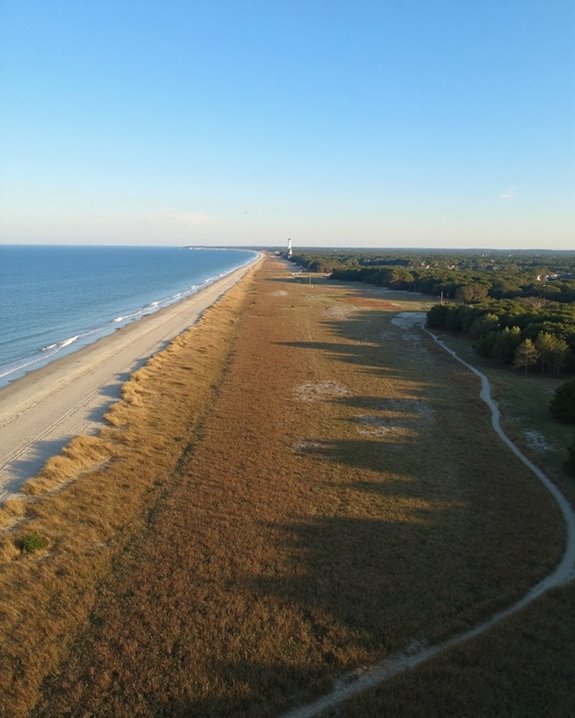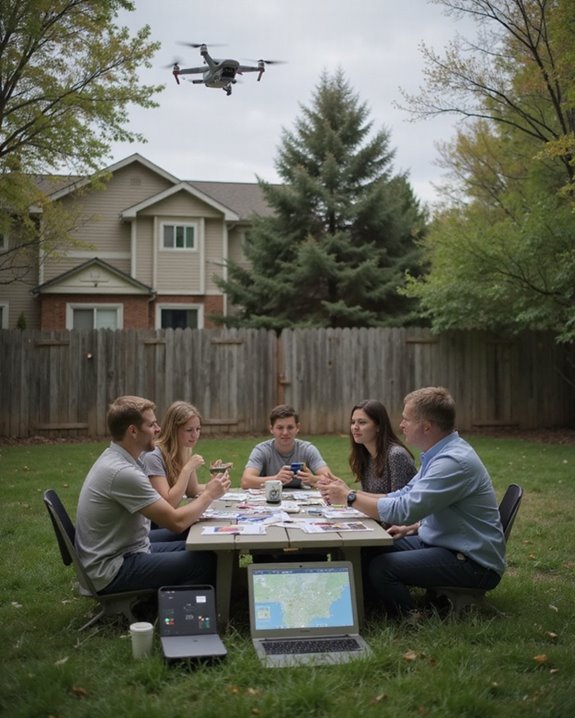In Delaware, flying a drone is both fun and legal if you stick to the rules—register with the FAA if your drone weighs over 249 grams, ace the TRUST safety test, and explore spots like Banning Regional Park, Wilmington’s DuPont Building, or Cape Henlopen State Park (permit needed!). Just remember: no buzzing over crowds, refineries, or military bases—even if your drone wants adventure! Keep your drone in sight, respect others’ privacy, and stay current with flight zones. There’s plenty more to discover.
Key Takeaways
- Check FAA rules and register your drone if required before flying anywhere in Delaware.
- Use the B4UFLY app or DJI FlySafe to confirm if your chosen location is in restricted or approved airspace.
- Popular legal spots include Wilmington landmarks, Bennett’s Pier Beach, Banning Regional Park, and Cape Henlopen State Park (with permits).
- Avoid flying over state parks without permits, crowds, or sensitive areas like power plants and military bases.
- Always respect privacy, keep your drone in sight, and follow Delaware’s state and federal safety guidelines.
Understanding Federal and State Drone Regulations in Delaware
When it comes to flying drones in Delaware, understanding the rules is just as important as knowing how to work your remote! Delaware’s regulation history shows a balance between federal oversight and state-specific rules. Federal laws—like requiring drone registration with the FAA and passing the TRUST test—take center stage, and state laws can’t overrule them. Unlike some countries with looser controls, Delaware stands out globally for its tight integration of state and federal policies, which means no local drone ordinances allowed! Local governments may help enforce rules, but they can’t make their own. Special permits are needed for state parks or large events, and privacy matters are taken seriously. Flying over refineries or military bases? That’s a big no-no—Delaware’s watching! Additionally, many drones weighing under 249g, such as the DJI Mini 3, can be flown recreationally without FAA registration, simplifying compliance with federal rules through weight and size restrictions.
Approved Locations for Recreational Drone Flights
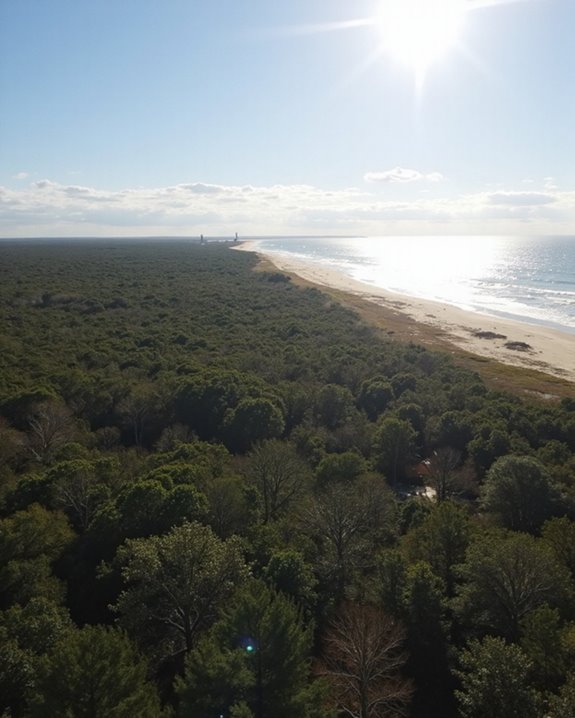
Knowing the rules is only half the adventure—now it’s time to find out where to actually launch your drone in Delaware! If Urban Skylines are your thing, Wilmington’s historic landmarks like the DuPont Building and Old Swedes Church offer fantastic city shots, while Downtown Dover brings classic state buildings into your frame. For those who love Coastal Flights, Bennett’s Pier Beach and Cape Henlopen State Park serve up sweeping ocean views—just remember, some spots like Bethany Beach are off-limits! Banning Regional Park and Big Oak County Park are perfect for wide-open flying, especially if you want to avoid crowds. Don’t forget spots like New Castle’s colonial streets or the scenic Delaware Memorial Bridge, but always check airspace rules before you launch—no one wants a surprise landing! To stay compliant with FAA regulations, consider using a drone remote ID module that offers precise GPS tracking and easy installation.
Commercial Drone Operations and Legal Requirements
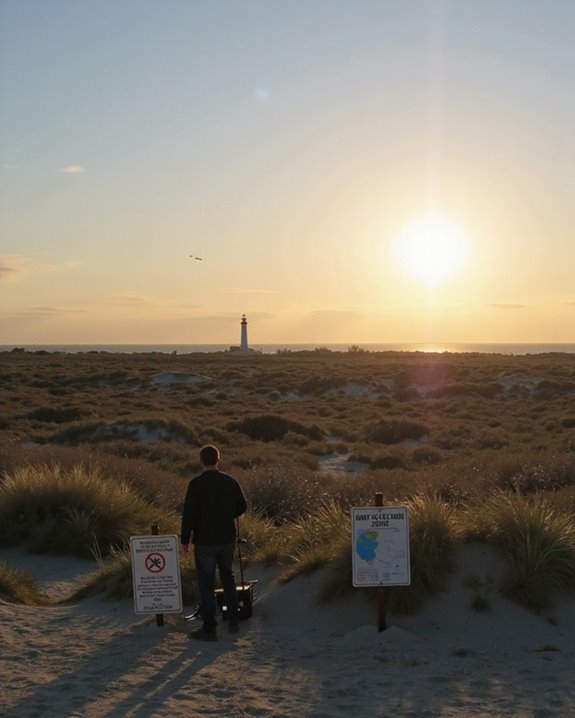
Launching a drone for business in Delaware isn’t just about showing off your flying skills—it’s about following the rules to the letter! Anyone hoping to earn money with their drone must comply with FAA Part 107, which means passing a test to get a Remote Pilot Certificate. That test even checks your English proficiency—so you have to read, speak, write, and understand English well! Register your drone if it weighs over 0.55 pounds, keep it within your line of sight, and always carry your operator ID. While Delaware doesn’t require extra state permits, smart operators carry liability insurance to protect their business; accidents can happen, after all. Remember, flying above 400 feet or at night is off-limits without special FAA permission. Play by the rules, and fly safe! Maintaining a detailed operator logbook is also recommended to document flight hours and compliance.
No-Fly Zones: Restricted and Sensitive Areas
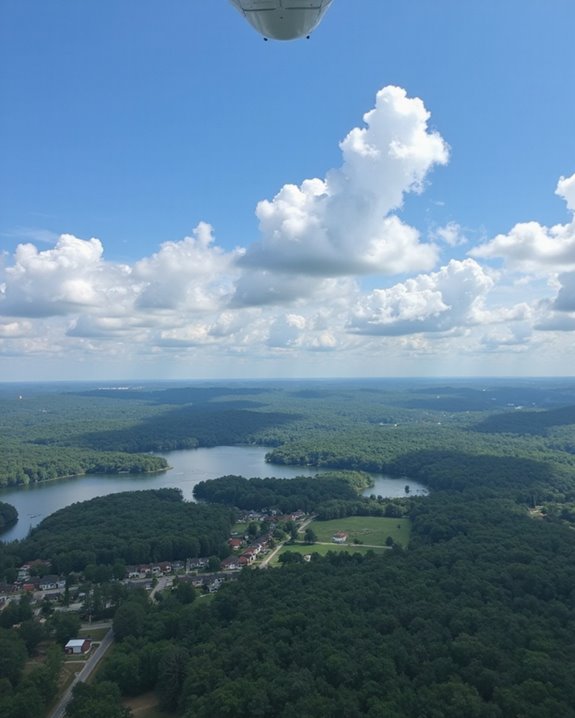
A quick glance at a Delaware map might make it look like you can fly your drone anywhere, but the skies aren’t quite that open! Delaware’s no-fly zones are grounded in Zone History—think FAA restrictions, local ordinances, and areas marked by “No Drone Zone” signs. You’ll find permanent restrictions over critical infrastructure like power plants, military bases, and government buildings, plus temporary restrictions (TFRs) during big events, such as concerts or football games. Beaches and public areas in some towns also have their own rules, so check before launching! Tools like the B4UFLY app, DJI FlySafe, and UAS Facilities Map help spot these sensitive spots. With Future Zones likely as technology evolves, always double-check the latest rules—better safe than fined!
State Parks and Special Permission Guidelines
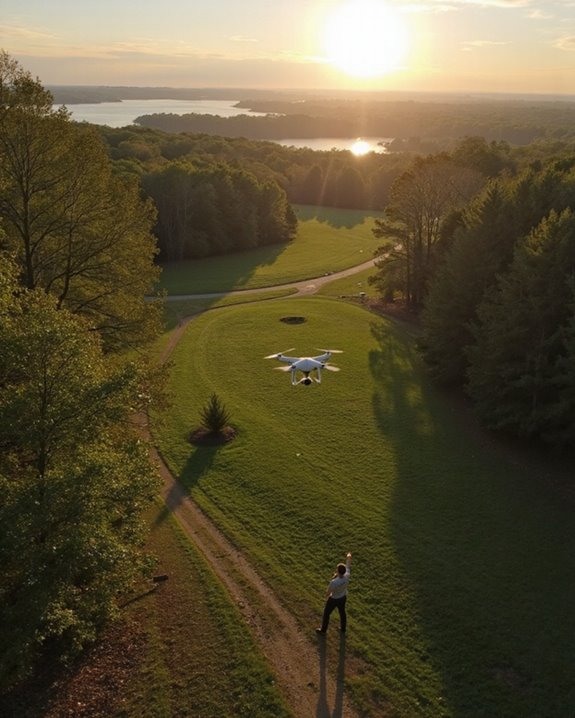
Delaware’s state parks are packed with natural beauty and family fun, but don’t expect to just toss your drone in the air and start filming like you’re auditioning for National Geographic! In these parks, drones are generally off-limits unless you score special permission through a detailed application process. Pilots must apply to the Division of Parks & Recreation, outlining when, where, and why they want to fly, and pay a $75 administrative fee. Each request is reviewed case-by-case, and permits can be denied if safety or park enjoyment is at risk. If a permit is denied, there’s a Permit Appeals process, so all hope isn’t lost! Guideline Updates happen frequently, so always check for new rules or drone-friendly zones before planning your aerial adventure.
Using Drones for Insurance and Property Assessment
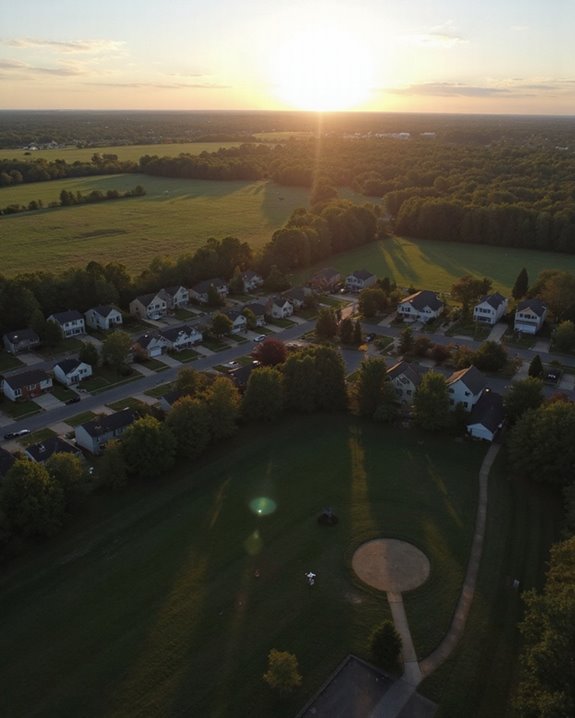
Ever wondered how insurance companies can inspect rooftops or storm damage without sending someone up a wobbly ladder? Thanks to drone technology, insurers in Delaware now use high-resolution aerial photography for speedy property assessments, bringing big Efficiency Gains and serious Safety Improvements! Drones can quickly fly over damaged homes after a storm, snapping detailed photos that help adjusters process claims in record time. No more risking life and limb or waiting days for an inspection crew! The Delaware Department of Insurance guarantees this process follows strict rules, protecting both property owners and consumers. While drones can’t spot every scratch—tiny cosmetic issues might slip by in a blurry photo—they do capture clear evidence of major property damage. Fast, safe, and accurate—what’s not to love?
Altitude, Speed, and Visual Line of Sight Rules
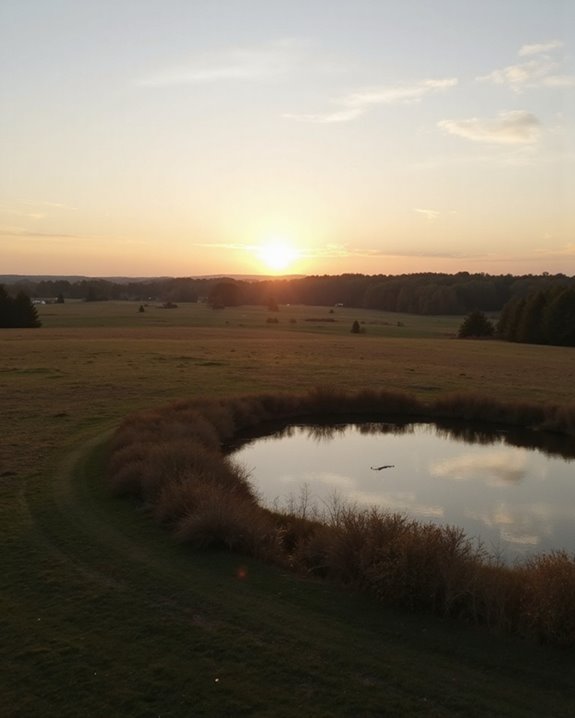
Let’s talk about the basics every drone pilot in Delaware needs to know: altitude, speed, and keeping your drone in sight. The FAA says you can’t fly higher than 400 feet above the ground—no superhero stunts allowed! Need to go higher? You’ll need special permission. Delaware doesn’t make stricter altitude rules, but watch out for temporary flight restrictions near big events or sensitive sites. Don’t zoom around too fast either; the speed limit is 100 miles per hour. Wind impact can sneak up on you, so check the forecast and adjust your speed accordingly. Always keep your drone within visual line of sight, especially in tricky lighting conditions like dusk or dawn. No binoculars—use your own eyes, and stay safe!
Legal Consequences for Unlawful Drone Use
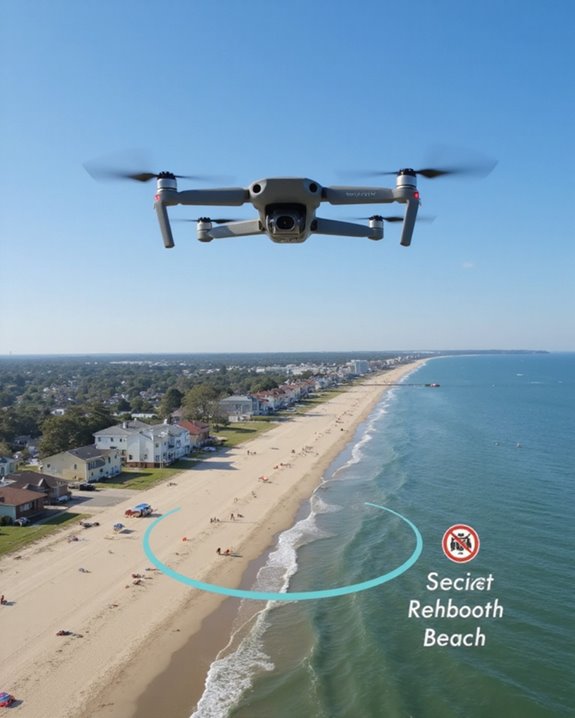
How serious can things get if someone breaks the drone rules in Delaware? Well, buckle up—penalties can be tough! A first-time offense is just an unclassified misdemeanor, but if someone keeps making mistakes, that escalates to a class B misdemeanor, which means bigger fines and maybe even jail time. Delaware’s legal system doesn’t mess around, especially if drones fly over restricted spots like state prisons. Dropping contraband by drone into a prison? That could mean up to three years in jail! There are also civil fines—sometimes, courts might triple the damages owed. Legal appeals are possible, but they’re no guarantee. Reform efforts in Delaware could make penalties even stricter, so it’s smart to stay on the right side of the law.
Tips for Safe and Responsible Drone Piloting in Delaware
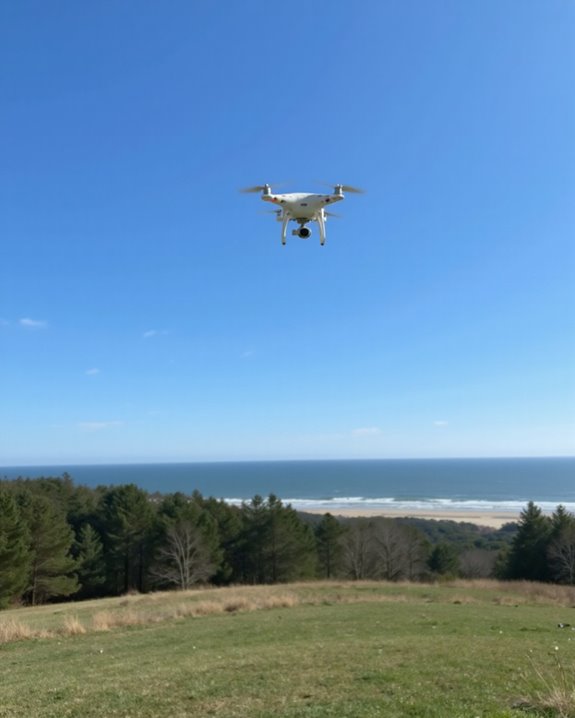
Flying Delaware’s skies with a drone can be an exciting adventure, but it does take some planning and common sense! For safe and responsible piloting, always check the weather—rain, strong winds, or even fog can turn your flight into a wild ride you didn’t sign up for. Weather awareness helps protect both your drone and the people below. Battery management is also key; nobody wants their drone dropping into a pond because they pushed their luck! Bring extra batteries and make sure they’re fully charged before takeoff. Stay in sight of your drone, avoid flying over crowds or state parks without permits, and respect people’s privacy—nobody likes a surprise fly-by. Follow FAA rules and you’ll keep your drone (and fun) off the ground!
Frequently Asked Questions
Can I Fly a Drone at Night in Delaware?
As night falls like a velvet curtain, Delaware permits drone flights at night if pilots prioritize nighttime safety, equip drones with anti-collision lighting, follow FAA Part 107 rules, and avoid restricted zones, large gatherings, and critical infrastructure.
Are There Age Restrictions for Drone Pilots in Delaware?
Age requirements for drone pilots in Delaware differ by use. Youth regulations allow no specific minimum age for recreational pilots, provided they follow FAA guidelines. However, commercial pilots must be at least 16 years old to obtain certification.
Do I Need Insurance to Fly My Drone Recreationally?
Like carrying a shield in the age of drones, insurance is not required for recreational flights, but various insurance options and liability types exist, offering protection against accidents or damages for cautious pilots seeking additional peace of mind.
How Do I Register My Drone With the FAA?
To register a drone with the FAA, an individual completes the online process at FAA DroneZone, provides necessary details, and pays registration fees. Upon approval, a unique registration number is issued for marking on the drone.
Can I Modify My Drone With Extra Cameras or Sensors?
Drone enhancements, such as adding extra cameras or sensor upgrades, are permitted if they comply with FAA regulations on weight and safety. Modifications may impact registration requirements, flight performance, and must not violate privacy or local aviation laws.

